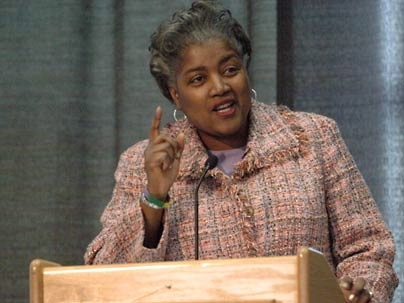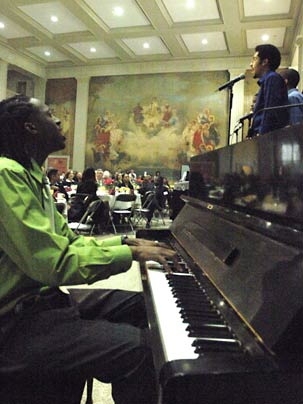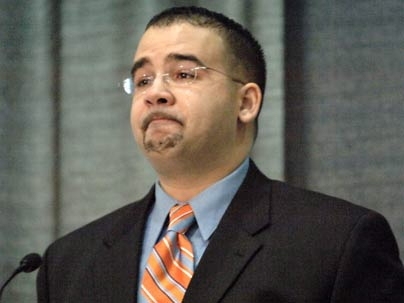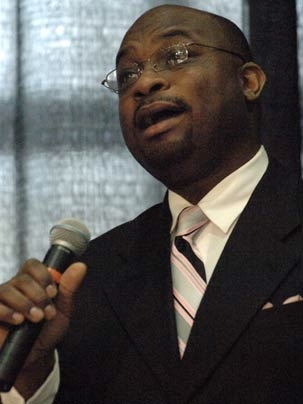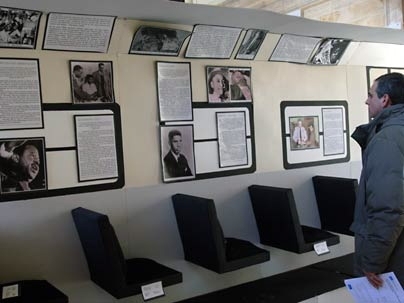The land of social and economic justice envisioned by Martin Luther King Jr. was brought to life in words and music during the 32nd annual breakfast celebration to honor the slain civil rights leader's legacy, held on Thursday, Feb. 9, in Walker Memorial.
Titled "Dr. King's Unfinished Agenda: A Call for Economic and Social Justice in the 21st Century," the event featured keynote speaker Donna Brazile, political consultant and chair of the Voting Rights Institute; MIT President Susan Hockfield; student speakers; and performances by the MIT Gospel Choir.
This year, the gathering honored King, who was assassinated in 1968, and his wife, Coretta Scott King, who died on Jan. 30. Mrs. King was the MLK breakfast keynote speaker in 1994.
Hockfield and Brazile commented on Mrs. King's role in furthering her husband's dream of a just society and described steps to realize that dream.
Hockfield encouraged the 350 attendees to recall Mrs. King, whose example "compels us to consider the achievements of a movement that seems ever more remarkable with the passage of time," she said.
"Just as Coretta Scott King carried on her husband's involvement in civil rights, so we must review our commitment to Martin Luther King Jr.'s goals, to build a more inclusive, more pluralistic, more just society. His faith catalyzed her involvement; her faith should catalyze ours. We must step up. There is much to do to accomplish King's agenda," she said.
The president noted that MIT "acknowledges the call of justice, the imperatives of fairness and inclusion" and has a special responsibility to open education and careers in science and engineering to all those with the interest, ability and commitment to succeed.
Hockfield cited MIT's own diverse student body and a range of successful outreach programs as proof that "raising the bar is not only possible, but it is essential. MIT proves that fighting the tyranny of low expectations is the surest way to enable students -- all students -- to excel. And MIT proves that diversity and excellence can and should go hand in hand."
Hockfield cited three established MIT outreach programs -- MITES (Minority Introduction to Engineering and Science), a summer program for promising high school juniors; SEED (Saturday Engineering Enrichment and Discovery) Academy, for promising public high school students from Boston and Cambridge; and STEM (Science, Technology, Engineering, Math), for middle school students in the Boston Public Schools.
Hockfield also highlighted diversity initiatives recently announced by MIT Provost Rafael Reif. These seek to strengthen recruitment and retention of minority faculty.
Brazile, whose national political experience includes managing the 2000 Democratic presidential campaign, recalled Mrs. King as a friend and mentor whose "shoulders were sturdy and who kept the fire for freedom burning. She challenged us to build a coalition of conscience."
A native of New Orleans whose family members were dispersed to eight states and 14 different cities in the aftermath of Hurricane Katrina, Brazile declared, "So much still divides us. From the worst storm of all came a storm of indifference. While nature's storms treat us all equally, the nation does not. Now, more than ever, it's time to consider what it means to be poor in America."
"Katrina showed America there is still poverty in our midst. But we're told, 'we've done enough.' That's not true with a budget of $2.7 trillion that does nothing to ease pain and suffering," said Brazile, who has called Karl Rove personally to protest the budget and President Bush's State of the Union speech, she said.
Brazile urged those at the breakfast to protest policies that do not mitigate the "daily disaster of living in poverty in our great land. Find a way to help lift someone up! Keep the fire of freedom burning! The march has not ended.
"To the young: The world awaits your leadership. It's your moment to lift us, so we can walk together and create the beloved community," Brazile said.
Two MIT students -- David Lowry, a senior in anthropology, and John Pope, a junior in electrical engineering and computer science -- shared their experiences and their visions of America's present and its promise.
Lowry focused on how "Native American people have been lost in the national social conversation." Speaking particularly of his own group, the Lumbee of southeastern North Carolina, Lowry said, "We are the ninth largest group of Native Americans in the U.S., yet we are invisible to many historians, government officials and even other groups of Native Americans."
Lowry reminded those present, "In the last days of his life, King was voicing his disappointment in an unjust war in Vietnam that sent poor black, poor white, poor Native American and poor Latino men to die, and which killed many Vietnamese."
He cautioned those who sought to follow King's path: "Don't let us forget in 2006 that injustice and inequality anywhere is a threat to justice and equality everywhere."
Pope recalled King's poor peoples' campaign and noted how the poor in America are kept "out of sight, out of mind."
"At MIT we need to keep our eyes open to the problems of the poor. Martin Luther King worked to bring the face of poverty into plain sight. It's up to us to continue his work -- to keep everyone in sight and in mind," said Pope.
Reif introduced the MLK Visiting Professors -- Taft Broome, Engineering Systems Division; Earthea Nance, urban studies and planning; and Dale Joachim, computer science.
Deborah Liverman, assistant director of the MIT Careers Office, introduced recipients of the Dr. Martin Luther King Jr. Leadership Awards -- Acia Adams-Heath, fiscal officer in the Microsystems Technology Laboratories; graduate student Oluwamuyiwa Olubuyide; and Charles M. Vest, professor of mechanical engineering and president emeritus.
Graduate student LaTonya Green was mistress of ceremonies. Ronald Hopkins and Hiram Ettienne, both of MIT's Department of Athletics, Physical Education and Recreation, performed musical selections. Rev. John Wuestneck delivered the invocation, and Rev. Johanna Keifer delivered the benediction.
A version of this article appeared in MIT Tech Talk on February 15, 2006 (download PDF).
